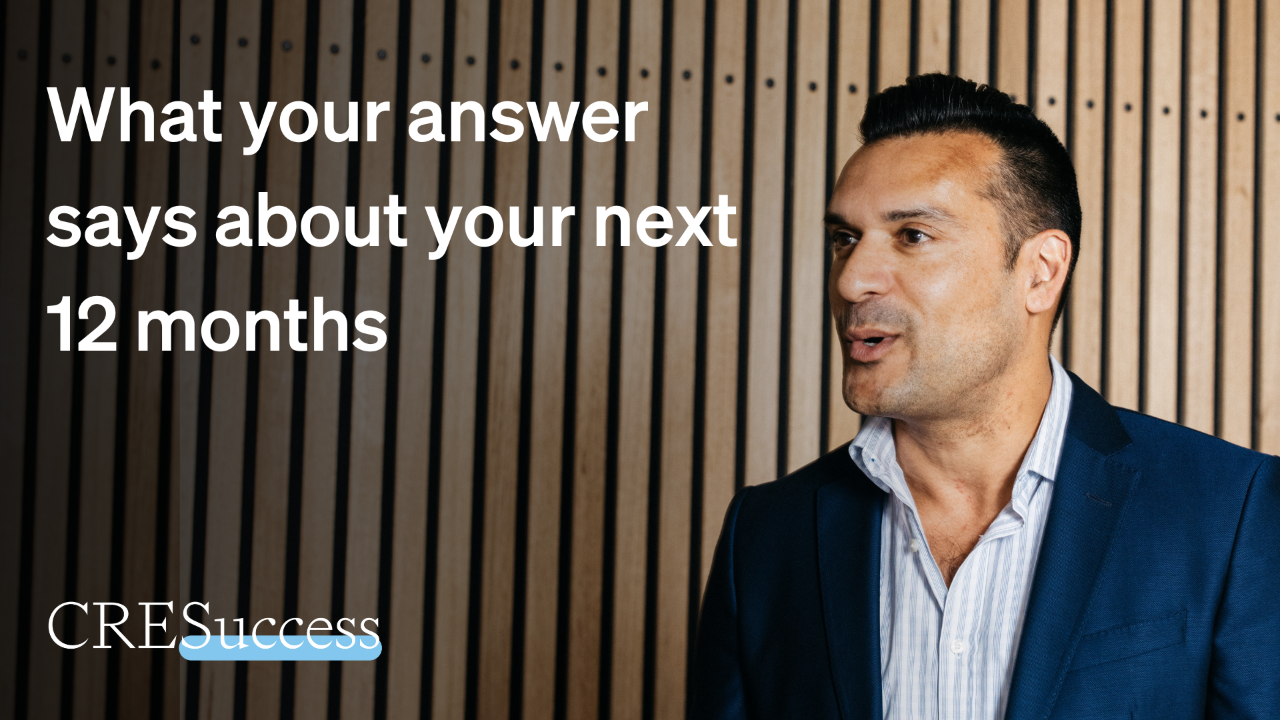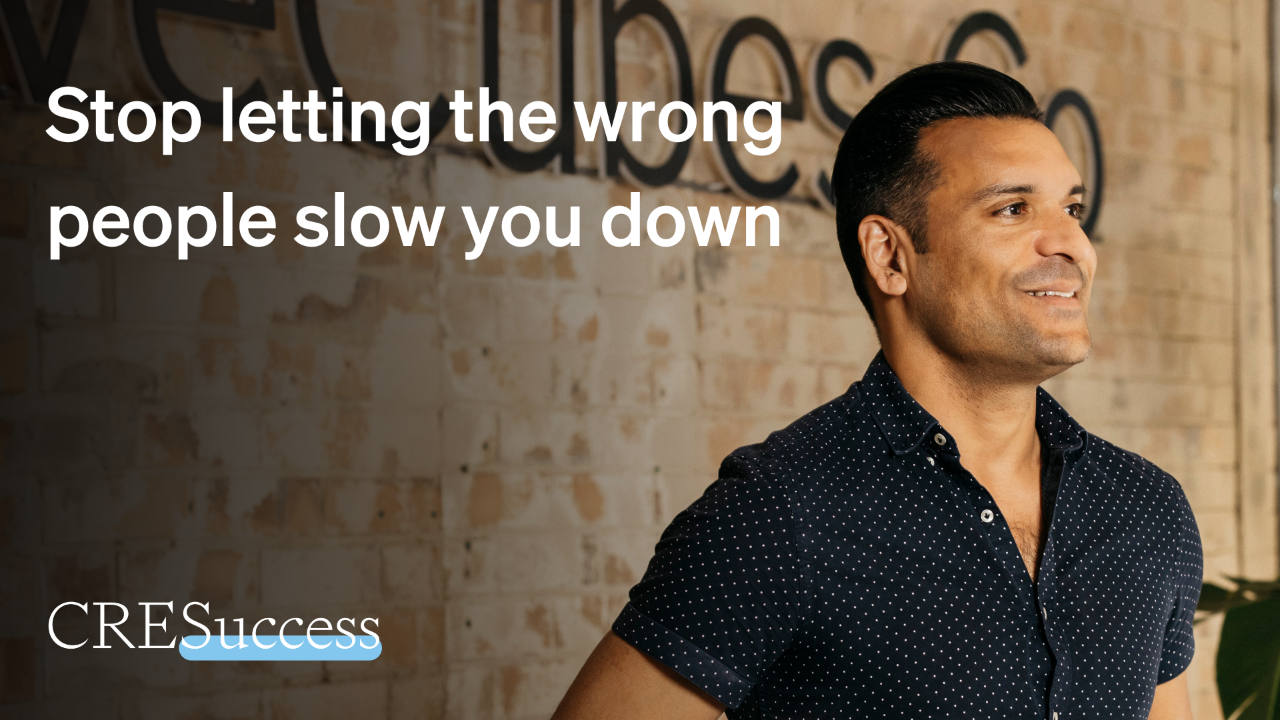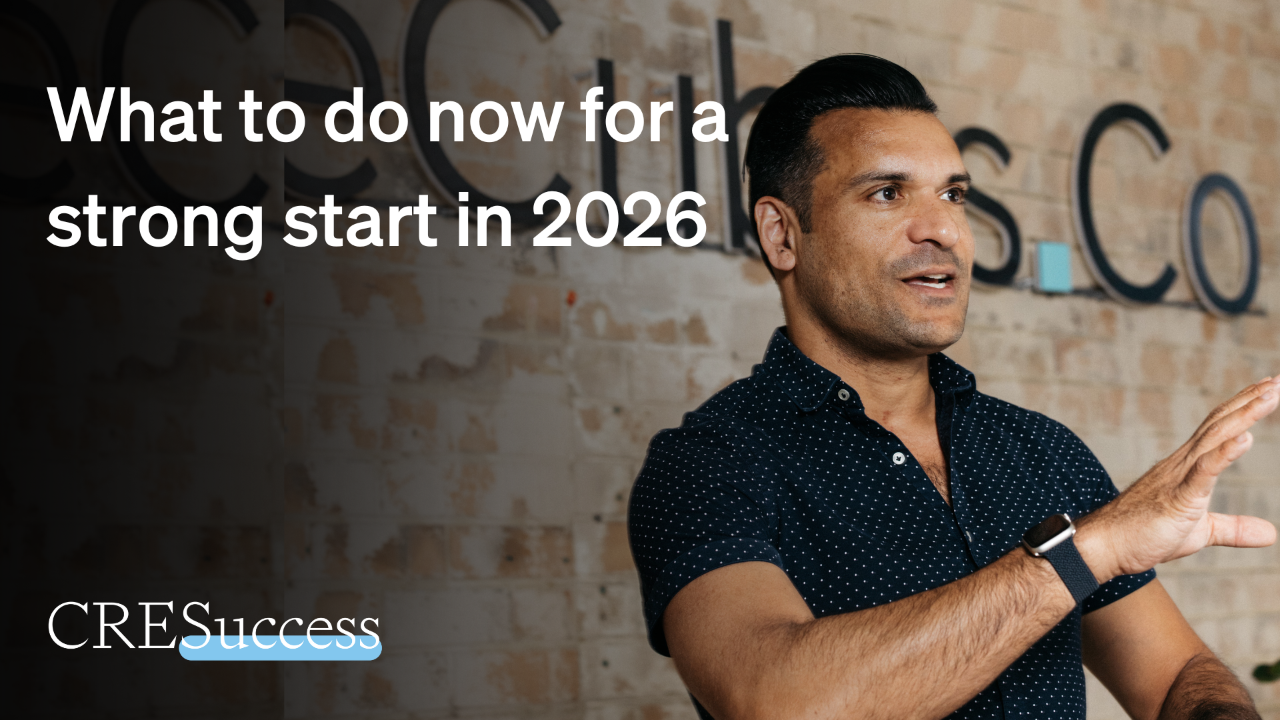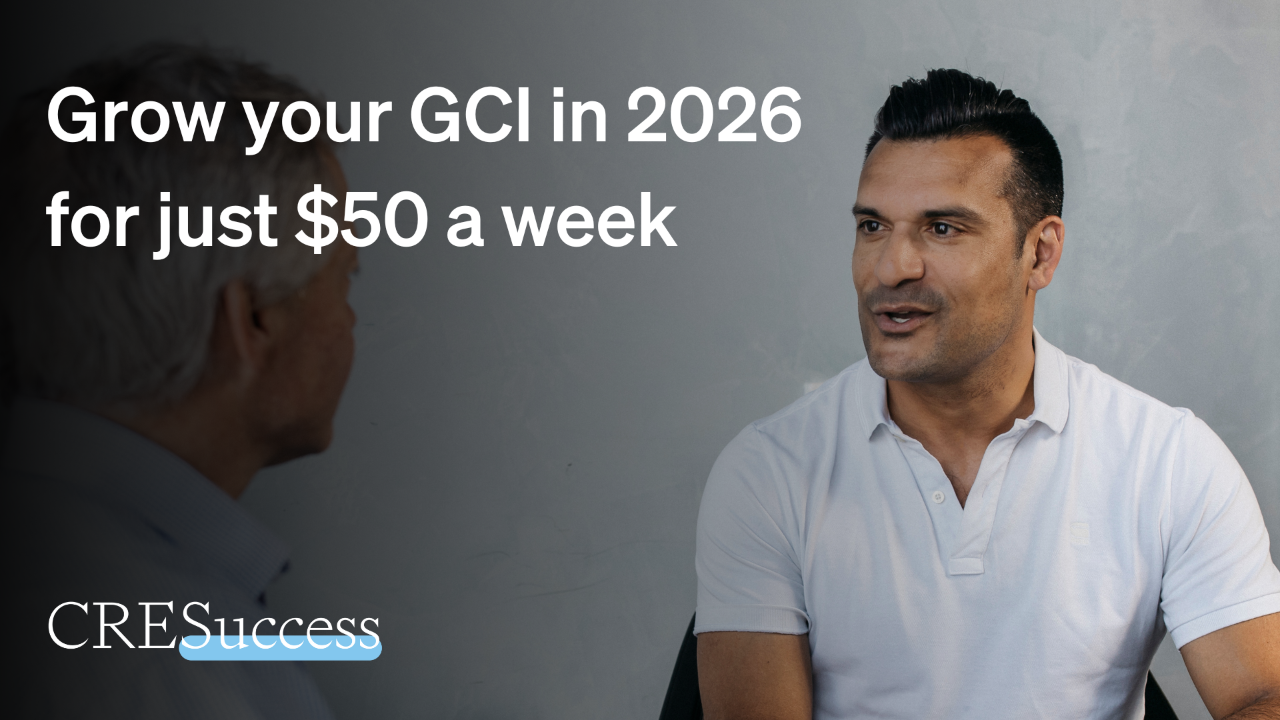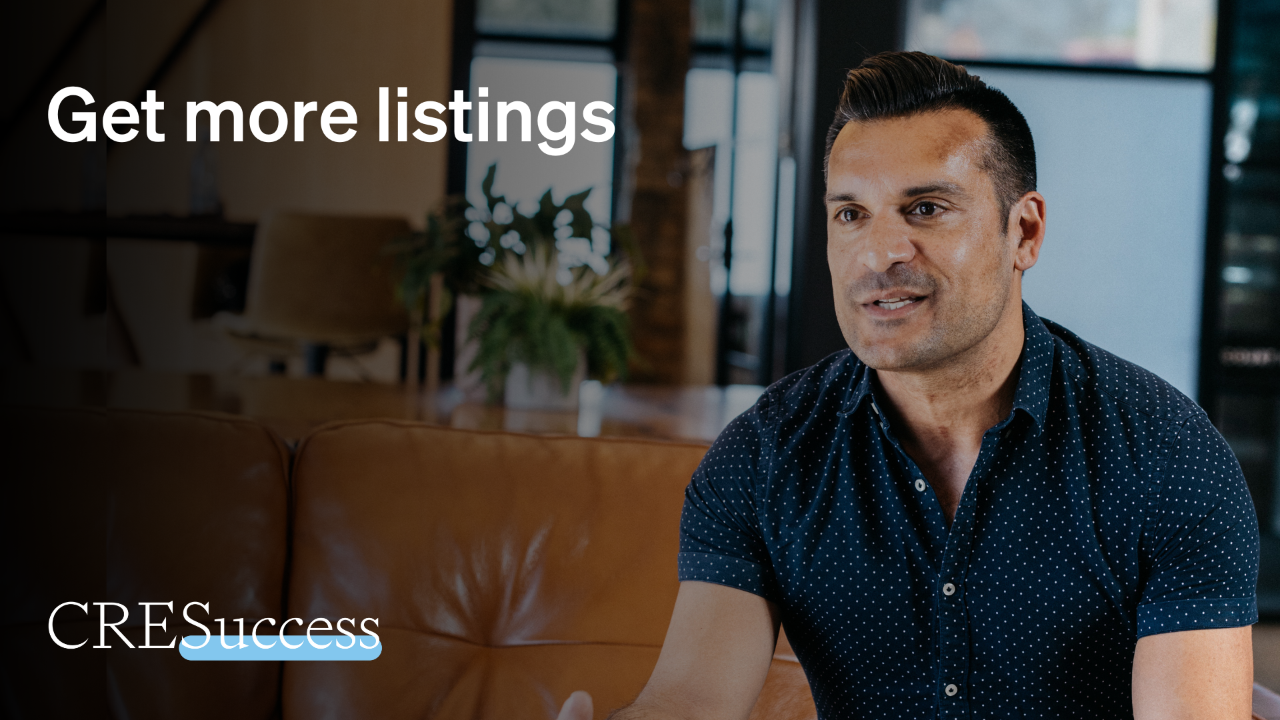Prepare thoroughly, network genuinely, and go after what you want.
Jun 19, 2024
Simon Borham moved from Sydney to Newcastle during the COVID years, but the big changes in his life didn't end there.
This husband and father of three kids under 5 then left a secure and senior corporate job to start his own property advisory business in 2023.
Simon decided to focus on serving clients in a market where he had no established roots.
And, in less than one year, he's built a thriving and rapidly growing business that now employs two people, in addition to himself.
At Eastview Advisory, Simon helps investors and occupiers to buy and lease, and he’s also delivering project management support on new developments.
His early success in entrepreneurship is a testament to the power of preparation and it has come from the fruits of genuine networking.
If you’re looking to start or grow a commercial real estate business, learn from Simon’s example:
Prepare thoroughly, network genuinely, and be prepared to go after what you want in life.
Simon is one of my private clients at CRE Success. You can hear his full story in episode 182 of Commercial Real Estate Leadership.
Episode transcript:
In Australia during the COVID years, there were many people who decided to pack things up from our big cities and move to regional areas.
It used to be known as the tree change or the sea change. It was the exodus from big cities during the COVID years.
And one person who did that with his family is my guest today. We're going to hear how he decided to actually leave a high paying job in corporate and start his own business in an area where he didn't have any roots.
And he's going to tell us how it is that he's built that business through creating a whole new network of contacts, which have allowed him to grow his business to a very impressive level in just one year.
Hello, and welcome to episode 182 of Commercial Real Estate Leadership. I'm your host, Darren Krakowiak.
And if you have a commercial real estate agency brokerage advisory business and you'd like to see the revenue in that business grow faster, then I'm here to help.
And one thing I'd like to invite you to do before we meet our special guests today, Simon Borham, the Director of Eastview Advisory is to visit our all-new website.
We recently updated our branding. You may have noticed that some of the artwork for the podcast looks a little bit different now and your podcast directory.
Well, our whole brand has been updated in terms of how we're presenting ourselves on social media and on our website. And I think you're going to really like how it looks.
And I would love your feedback on it as well. But in order to get that you've got to go and check out our website. It's cresuccess.co
There's heaps of resources. You can get transcripts to all of our episodes on there as well.
And also, find out about how you can take the next step to work more closely with us at CRE Success.
So, go to our website cresuccess.co
Let's get into today's interview.
--------------
Darren Krakowiak
Simon Borham, Director of Eastview Advisory, welcome to Commercial Real Estate Leadership.
Simon Borham
Good day, Darren. Thanks for having me, mate.
Darren Krakowiak
Thank you so much for being here. I'm really excited to talk to you today. Your background is a little bit different to most of my clients, you are a property guy, but you weren't working for a service provider before you opened up your own business. So, let's go back in time a little bit. You did a commerce degree. Like me, I think?
Simon Borham
I did. And probably only did a commerce degree because the university that I went to didn't offer a property degree. But that is where we started.
Darren Krakowiak
So, you wanted to go into property even when you were in high school. You had some idea about it?
Simon Borham
Yeah, I always had an interest in it. I'm not sure where it came from. But it was yeah, it's always something that I was certainly drawn to.
Darren Krakowiak
Okay, so after you did your degree in commerce, you landed in a future leaders graduate program at Unilever, a great global company. Just tell me about your decision to go for and accept that position and how it then led you down the path of a property career.
Simon Borham
I was probably a little bit competitive. My girlfriend at the time, got a job with Procter & Gamble, who was his Unilever's globally biggest competitor. And I thought, well, if she can do it, I want to make sure I'm not getting left behind. So, I went and applied for the biggest competitor. And I applied for the supply chain team, mainly because they have quite a number of large industrial assets. And that was something that was appealing to me at the time. I didn't really know how it was going to work out. But they looked like they had like the graduate program, had some international rotations planned into it. And it was quite competitive. So, something I was quite proud to get.
Darren Krakowiak
Awesome. So, after Unilever, where you did a little bit of property stuff, you then moved into ALDI, where you rose through the ranks quite quickly, according to your LinkedIn profile, as far as I can tell, and you took on more and more responsibility. Now this is a podcast about Commercial Property Leadership. So, what I'd love to hear from you about your time at ALDI is one, maybe one or two of the big deals that you negotiated that stick out in your mind. And also, two, the composition of the teams that you were leading while you were there.
Simon Borham
Yeah, sure. So yeah, I did do a number of roles at ALDl. I started in the industrial team. So, it was quite a logical transition across from what I'd been doing at Unilever. One of the major projects we did there, we had some quite big sheds. There are eight large sheds across Australia. And I was responsible essentially for the ones in New South Wales. So, one of the first things we needed to do was increase the capacity of that distribution center. So, it was about 40,000 square meter facility that had ambient, was tried tamp, so Ambien, chiller and freezer. And we were servicing about, sort of up to 160 stores out of that distribution center. So, one of the first projects we needed to do was essentially completely dismantle the internals of that thing and reset it up to make sure that it was going to be fit for a future purpose. In doing that, at the time, it was quite an outsourced model. So, the leadership responsibility that I had at the time was in managing and appointing external consultants, project managing and leading, you know, all the negotiations and then making and overseeing the project through to delivery.
Darren Krakowiak
Okay, and what about some of the size of the teams that you are leading towards the pointy end of your time at ALDI?
Simon Borham
So, with the last role that I was adding the property team at ALDI was the Project Director for the Eastern Seaboard. So, we were responsible for the basically delivery of a store refurbishment program, which involves renegotiation of all of our leases, extensions, deciding on an extension or renovation strategy, and then delivering that. So, at that time, I was responsible for around 20 internal staff and up to about 80 different consultants.
Darren Krakowiak
Okay, so some big teams. It's funny, you mentioned refrigerated warehouses. I remember back in my service provider days, my Head of Property Management at the time, he didn't want to take on refrigerated cold storage warehouses because there's too many headaches, too many problems, they're challenging to manage. So, I have more respect for what it is that you were doing, given my understanding of how complex it is to operate them.
Simon Borham
They're very painful. I don't think ammonia is very well understood. But ammonia is a chemical which drives a lot of these refrigeration plants. It is one of the most dangerous substances going around.
Darren Krakowiak
It's fires can be an issue.
Simon Borham
Yeah, flammable. And there's a saying with ammonia is, 'smelling ammonia is the last thing you'll do'.
Darren Krakowiak
All right. Okay
Simon Borham
It's light out very quickly. So, making sure that those plants are maintained and managed properly. It's quite a responsibility.
Darren Krakowiak
Okay, well, I understand where your resistance to manage them come from now. Look, you obviously learned a bit about negotiation and also about leadership at the time you're at ALDI. So, can you share with me maybe one or two principles that you have around both of those skill sets? Let's start with negotiation. So, what does the Simon Borham negotiation approach look like?
Simon Borham
I don't know if this would be very well shared. But I genuinely believe in negotiating for win-win outcomes. I know there's a lot of people that I learned from during my career that just believed in, you know, trying to be strong handed and get the win over other people through moral means or otherwise. And it's just really not my approach. My genuine approach to negotiations is that there's deals to be done. And my job is really to make sure that everyone can come to the table, and walk away with an outcome that they're pleased with. And generally, the best way to do that is to be very open, and to be very well prepared. I walked into a negotiation yesterday to purchase a two and a half million-dollar warehouse on behalf of a client of mine. And before we walked into that negotiation, we spent an hour at the whiteboard, preparing for what are the negotiate? What are the variables that we're going to negotiate on? What is our best case and worst case for each of those variables? What points are we walking away? If we say this, they'll say that. Had been prepared for every possible outcome, and spending an hour and a half preparing for a 15-minute meeting. That might sound counterintuitive to some, but we were able to walk in there. We were super prepared. Now, we ended up walking out buying the thing for about 150 grand, less than our walk away price. So, my client was absolutely stoked.
Darren Krakowiak
So, how does that approach of being open and also well-prepared change if you're dealing with maybe someone who is not a good faith negotiation partner?
Simon Borham
It is very interesting; I think you can get a read on people quite quickly as to who they are and what their motives and their intentions are. And so, my approach, and if I use that one as an example, was to walk in there and be very open about the things that we weren't there to discuss, and also very open with the things that we were willing to discuss. So, one of the things for us was the price. And we went in and put an anchor down straight away and just said, "This is the price that we're prepared to pay." Which was substantially under what they were originally willing to accept. But we also said, "In order to get that price, here are the three variables that were willing to negotiate on." And it was a lease to purchase situation. So, there was more variables than a normal straight out purchase transaction. And so, we're able to use those to influence the purchase price in our favor.
Darren Krakowiak
Yeah. And with the more variables makes it more, I guess, possible to land at that win-win solution because you've got more anchors or more levers to pull, I guess.
Simon Borham
Exactly.
Darren Krakowiak
Yeah. Then there's leadership now specifically leading teams of people, what do you think underpinned your style in that regard?
Simon Borham
I think the biggest thing is really, like people say, "Treat other people how you want to be treated." And I think for me, it's like, treat other people how they want to be treated. Like, I'm quite, I'm a very genuine person. I'm very open and very honest with my team. But I also find, I take genuine enjoyment in building relationships with people. And I think if you meet with your new, you know, every time you sort of onboard a new team member or take over a new team, I focus straightaway on getting to know who they are as a person. You know, what their motives are, what makes them tick, learning about their family and understanding their story, and building a really genuine relationship. And then I think that is really, that becomes the basis for building a successful team. Because if you care about the people as humans first, you're always going to want to do the right thing by them. Because you care about them. And they'll always want to work hard for you for the same reason.
Darren Krakowiak
Interesting. I like that. Treat people how they want to be treated. Not necessarily how you want to be treated. That's a new one. I haven't heard that one before. Where'd you learn that?
Simon Borham
It was something that I've picked up over time when someone much smarter than me said it at some point. And it really rung true. I think at the time I was managing; I was leading to very different people in a situation. And, you know, sort of like, they call that, if the only tool you have in your tool belt is a hammer, then everything looks like a nail. And I just kept treating those two people exactly the same and getting wildly different outcomes. And and I worked out that once I understood them, and their motivations better, my approaches to each of them changed and the outcomes followed. So, I found that to be true.
Darren Krakowiak
Yeah, awesome. All right. So, fast forward to last year, you decided to go out on your own, what was the impetus that led to that?
Simon Borham
For me, I'd spent probably, five to eight years chasing the role of director at a large corporate. And I got it a few years ago, and worked out pretty quickly that it really wasn't what I wanted at all. I wanted to earn good money. I wanted to be in a position where I was able to make decisions. But I didn't realize probably until I started having kids that I wasn't willing to do it at all costs. And there was a good period of time there where I'd leave home in the morning while my kids are asleep, and I'd come home, and they'd be asleep again. And I'd only really get to see them, Saturday and Sunday. And that I think once I realized that my motives had changed somewhat that I figured out the best way to take back control of my time was to go out on my own, be my own boss.
Darren Krakowiak
Yeah. Interesting. And you've got I think three kids under five. Is that right?
Simon Borham
Yeah. Three kids under five until tomorrow, actually.
Darren Krakowiak
Okay, as at the time of recording, then you'll have three kids under six.
Simon Borham
That's right. Yeah.
Darren Krakowiak
Happy birthday to yourself. All right. So, one time we spoke in the past, you told me about maybe the reason why you specifically wanted to help people with property investment. It was because of maybe a negative experience that you had earlier on in your property investing journey. I'd love to hear about that origin story, which perhaps gives a bit of fire and some backstory, some origin story to why it is you're doing what you are now.
Simon Borham
Yeah, I was working really hard as a young grad. I was saving. I wasn't earning big money at the time. But I was trying to save a good portion of that. I finally saved up a house deposit. And the first place I bought was in 2015, in Brisbane. It was just like a foreign to residential property. And I reached out, I got expert advice. I used the buyer's agent to buy that property, someone that I trusted. And essentially, what ended up happening was I worked out that I was the only person in that deal that didn't make money. There were undisclosed personal relationships between the builder, the landowner and the buyer's agent. Every service provider that was recommended to me was basically getting a clip of the fee that I was paying to them. Also, that they would get a fee but the buyer's agent would also get a clip, and it was just full of undisclosed conflicts of interest. And essentially, that property ended up holding me back. There’s a huge opportunity cost with it where I held it for, I think I sold it when the market was booming for $8,000 more than I paid for it back six or seven years earlier. So, the opportunity cost was costing me so much to hold that I couldn't save anymore. And the time between buying that property and my next one was like four years later for that reason.
Darren Krakowiak
There's a little bit to unpack there. I don't want to spend too much time because we're not a property investment show. But one little thing I love is that you were willing to sell it, right? You didn't hang on to one, like, "I've got a belief that I want to hold on to all my investments." Right? But sometimes you've got to make the decision to let go of them because it wasn't the right investment at the time. And you just cut the losses or take your $8,000 out. It isn't easy to let go of it. So, I like the fact that you've shared that. How is it that that I guess puts you in a better position to help clients at Eastview advisory?
Simon Borham
The main thing, and I think, it's just core to any type of advisory services to be completely independent. And that's what we promise our clients. I actually tell a lot of our new clients that story, because it's a large motivation between the reason that I set up an advisory firm. I think there are people out there that will take advantage of people that don't know as much as maybe you do. And you know, having an expert on your side is really going to I guess, number one, help you to avoid making those costly property mistakes that I've made, but two, also then set you up to create future wealth. And I think that's a core difference that we have for our clients is that I just do not engage in conflicts of interest. I don't care how big or small or perceived or real or not real. I just want to do it. You know, if they pay me, I work for them. And that's as complex as I make it.
Darren Krakowiak
Excellent. Yeah, most of my clients run commercial real estate agencies known as brokerages in the US, which mainly serve landlord clients. Then you're focused on occupiers and investors. Right? So having you as a client, along with a couple of other advisors that work on that side of the transaction has been great for my business, because it represents some growth. So, thank you for coming on board. But a lot of our audience that's not typically the people who listen, or they might not understand exactly what it is that a firm like yours does. So, you can just tell us a little bit about what Eastview Advisory does and how you help your clients?
Simon Borham
Yeah, absolutely. So, we're essentially a full-service client side and advisory firm. And the way that I describe it to people is when I worked for a company like ALDI, as an example, I'd be given a mandate to find a new store somewhere in New South Wales. So, I would go out, I would do market analysis, find out where we needed a new store, whether it was one that was going to support, whereas a population big enough to support a store? We would do like a verse lease analysis to figure out what would be the best option for the business. And then we'd go to market, find that property, negotiate the purchase or lease, and then we would go through the design and construct of a new store. So, we offer that service to all of our business and private investor clients, where we can represent them at any stage in that property cycle. So generally, it works out to be a buyer or tenant Advocate, or a project manager. So, we'll come in, we'll help them with their property problem, identify the best solution for them and then execute that. Then we can do turnkey, all the way through to throwing them the keys at the end of a completed development.
Darren Krakowiak
And you're located in Newcastle and you're typically working in that vicinity?
Simon Borham
Yeah, so based in Newcastle and the Hunna, I grew up in Sydney. I've only lived in Newcastle for the last sort of two and a half years. So, we are looking to expand down into Sydney at the moment. And we have a long-term goal of being in at least every capital city in Australia.
Darren Krakowiak
Awesome. Love that vision. One thing that's interesting to me about the fact you've only been in Newcastle for a couple of years is that in a relatively short period of time, you've built up your business to pretty healthy levels. And another skill that I believe you're pretty good at is networking, right? Because you've gone out there and build a professional network in a place where you didn't have any roots. So, I guess I'd love to hear from you around what had been some of the mainstays for you to build up a thriving professional network in the new area?
Simon Borham
I think I'm pretty fortunate that I just genuinely like people. And a huge part of business is network and relationships. And so, I've just been very focused on identifying who my biggest referral partners will be. And they're generally advisors to businesses. So, its accountants, financial planners, and lawyers, as well as real estate agents. And so, really the first sort of six months before I set up and really the 12 months since, have been trying to get a coffee with two new people every week to just sit down, hear about them and build a relationship. And everything that I've done has come off the back of that.
Darren Krakowiak
Awesome, simple goal, two coffees a week.
Simon Borham
It's smart. It's measurable, achievable. It really paid off. I'm still doing it now. I probably been able to do it a little bit less than I have been. Because we have picked up quite a fair bit of work. But I think it's just coming back to similarly with leadership, I think if you've got a genuine love and enjoyment for meeting new people, then you focus on that, and good things will come from it.
Darren Krakowiak
Well, Simon, thanks for telling me a little bit about your business and your background. I just want to ask you a few questions about the work that we've been doing together, because it's been about five or six months since you came on board as a client. So, can you tell me what was going on in your business before we got started working together?
Simon Borham
What I worked out was, you know, I've got a property, I've got a business degree, I did a master's degree in property. Well, during my time at ALDI, I've worked in property for a long period of time, but I've never worked at a real estate agency. What I worked out was I needed to bring a bit of agency thinking into my business. And that was really where I reached out to you obviously, with the experience that you've got running agencies, across Australia and multiple different countries. You know, I really thought that I would be able to benefit from your knowledge in that space.
Darren Krakowiak
Awesome. Did you have any hesitations to getting started?
Simon Borham
Mate, like people were in a networking function, obviously, as you know, on Friday night, and people asked me, "How did you meet Darren?" And the answer is like, "I don't know, you just popped up some random guy on my Instagram, read the social medias, which are very good at." So really, there was no warm introduction, there was no referral. And that's, you know, general it's like, you know, "Who's this guy?" This just popped up on my feed. So, the main barrier I had to get around was that. But you know, I think fortunately, for you, you're very well credentialed. You're very well known in the industry. And I just I spoke to a couple of people that do know you, and you came very well verified, and made a fairly quick decision in the end.
Darren Krakowiak
That's good to know. Thank you. I think it worked with a couple of business coaches before starting with me. So, what do you think the difference was? Why are we still working together and why you're not working with them anymore?
Simon Borham
Mate, for me it's the value. And it's like, I don't know if you're going to appreciate me saying this, you're not the cheapest business coach I've worked with. But the value that you've provided is 10 times what I've gotten from everybody else. And I think that any day of the week, it is worth it. Because you know, the business coaches I've worked with before is, "I'll meet with you once a quarter or once a month, and you've got an hour of my time, don't run over." And that's not how you work at all, you know, we get the one hour a month with you. And generally, our sessions end up being a bit longer than that, because we both we'd like to chat. But you also get the course that you provide. You get access to these networking opportunities. You know, I've already sat down with a whole number of your clients and opened up some pretty big opportunities for me already. So yeah, it's just the value that I get, Mate.
Darren Krakowiak
I really appreciate you saying that 10 times a day, because I know I'm expensive. But I'm not 10 times more expensive, right? But the value there on a relative basis, which is good. What's maybe been a surprise, something that you weren't expecting from some of the stuff we've been doing?
Simon Borham
I guess what I came to get from you was the agency knowledge. And probably the surprise was how little I knew. You know, a lot of the problems that I come to you with and say, "Darren, this is a problem." You're like, "Oh yeah, I've got a spreadsheet for that." Or, you know, "I've dealt with this before. Here's the answer." A lot of the people that I've worked with before, you go to with a problem, and they help you try and they're like, "Oh, let's spend the next six weeks workshopping how to fix that." And it's a lot quicker if the person you're going to already has the solution. And I've really appreciated that.
Darren Krakowiak
To be fair to those other coaches, they're actually doing coaching the right way, which is, you know, to ask questions, and to a vocal awareness. But, you know, sometimes I think if I've got the answer, I might as well just tell you, right? Like, or at least give you that perspective and to see if that's helpful, rather than a spent, like you say, you know, minutes or hours on it and trying to pretend I don't know what it is that you might want to do.
Simon Borham
Hundred percent! And I think if that was the case, if I was like, "Darren, I want to learn this thing and go on this journey." I know we do that. But if I'm like, "Darren, I've been stuffing this up for a month, can you just fix it?" And you're like, "Yeah, here's the fix." And then I can go and fix it and worry about other stuff in my business. So that's hugely valuable to be able to, you know, we can take both approaches, but sometimes I'm just like, "Just fix it, Darren." And you're like, "Here's the answer." And it's great.
Darren Krakowiak
Good. Love that. So, give me one word that you would use to describe working with CRE Success?
Simon Borham
I'd say reliable. You've never missed a meeting. You communicate really, really well. I know that if I call you, you're going to answer the phone. You know, I don't just feel like a one-hour client person, sort of one hour a month sort of client. I feel like I get a lot more of your time, and you're a lot more available and reliable to me than I probably expected.
Darren Krakowiak
Good. So last question, mate is, what advice do you have? And you've got some experience in investing in yourself, but there are some commercial real estate principals and people like yourself who are running buy side, occupier advisory type businesses who might be thinking about getting some help investing in themselves and accelerating the growth in their business, what's your message for them?
Simon Borham
I say this to clients of mine is if the service was free, would you use it? And a lot of people say yes. And I think that's probably true with a business coach. So, the main barrier for them, for people then is price. And so, my advice is, look at the value not the cost. It's, you know, it isn't really in the standard things overly expensive. And the value that you're going to get out of it will be multiple times more than you pay.
Darren Krakowiak
I like that. Sometimes I think about what's the cost of not doing something, right? Because there is a 100%.
Simon Borham
Yeah, a 100%. I could point to opportunities that I've had now because we've worked together that I wouldn't have had if we hadn't. And it's paid it off for sure. And I would have lost that.
Darren Krakowiak
The other belief I have is that when people don't pay, they often don't pay attention, right? Because they don't actually not invest in the process. I can charge $100 a month for coaching, but probably wouldn't be taken very seriously if I did, because people are not invested in you know, getting the result from it. Alright! Awesome, mate. I really appreciate you coming on the show today, Simon. Thank you for being a great client. I'm looking forward to continuing working with you and appreciate you being on Commercial Real Estate Leadership today.



